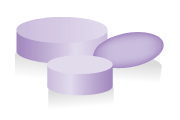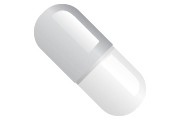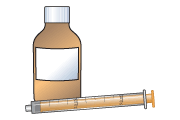Gabapentin for neuropathic pain
This leaflet is for parents and carers about how to use this medicine in children. Our information may differ from that provided by the manufacturers, because their information usually relates to adults. Read this leaflet carefully. Keep it somewhere safe so that you can read it again.
Do not stop giving Gabapentin suddenly.
Name of medicine
Gabapentin
Brand name: Neurontin
This leaflet is about the use of gabapentin for neuropathic pain (pain caused by nerve damage).
Why is it important for my child to take Gabapentin?
Gabapentin will help your child to feel less pain.
What is Gabapentin available as?
Tablets: 600 mg, 800 mg
Capsules: 100 mg, 300 mg, 400 mg; these contain small amounts of lactose
Liquid medicine: 50 mg in 1 mL; these may contain acesulfame K and saccharin sodium (artificial sweeteners), and propylene glycol. If you have any concerns or questions, speak with your child’s doctor or pharmacist.
When should I give Gabapentin
Gabapentin is usually given three times a day. This should be first thing in the morning, early afternoon and at bedtime. Ideally, these times are at least 4 hours apart.
You may start by giving gabapentin once a day for a few days, then twice a day for a few days, then three times a day. This will help your child to get used to the medicine. Your doctor will explain what to do.
It is important that you follow your doctor’s instructions.
How much should I give?
Your doctor will work out the amount of Gabapentin (the dose) that is right for your child. The dose will be shown on the medicine label.
When you first start giving Gabapentin to your child, you will probably give them a low dose, which may be increased bit by bit over a few days or weeks. This helps your child to get used to the medicine. Your doctor will explain what to do.
It is important that you follow your doctor’s instructions about how much to give.
How should I give Gabapentin?

Tablets
- Tablets should be swallowed with a glass of water, squash or juice. Your child should not chew the tablets.
- You can crush the tablet and mix it with a small amount of soft food such as yogurt, honey, or mashed potato. Make sure your child swallows it straight away, without chewing.

Capsules
- Capsules should be swallowed with a glass of water, juice or similar. Your child should not chew the capsules.
- You can open the capsule and mix the contents with a teaspoon of soft food (e.g. yogurt, honey or jam) or a small amount (10 mL, which is about 2 teaspoons) of fruit squash. Make sure your child swallows it straight away, without chewing. The capsule contents have a bitter taste, so you will need to use something strong tasting to mask it, such as undiluted fruit squash.

Liquid medicine
- Shake the medicine well.
- Measure out the right amount using an oral syringe or a medicine spoon. You can get these from your pharmacist. Do not use a kitchen teaspoon as it will not give the right amount.
When should the medicine start working?
It may take a few days or even weeks for Gabapentin to work properly, so your child may still have their symptoms for a while. This is because the amount of medicine has to be increased slowly. Continue to give the medicine as you have been told to by your doctor.
What if my child is sick (vomits)?
- If your child is sick less than 30 minutes after having a dose of Gabapentin, give them the same dose again.
- If your child is sick more than 30 minutes after having a dose of Gabapentin, do not give them another dose. Wait until the next normal dose.
If your child is sick again, seek advice from your family doctor, nurse, pharmacist, or hospital. They will decide what to do based on your child’s condition and the specific medicine involved.
What if I forget to give it?
If you usually give it once a day in the morning: Give the missed dose when you remember during the day, as long as this is at least 12 hours before the next dose is due.
If you usually give it once a day in the evening: If you remember before bedtime, give the missed dose. You do not need to wake a sleeping child to give a missed dose. You can give the missed dose in the morning, as long as this is at least 12 hours before the evening dose is due.
If you usually give it twice a day: If you remember up to 4 hours after you should have given a dose, give your child the missed dose. For example, if you usually give a dose at about 7am, you can give the missed dose at any time up to 11am. If you remember after that time, do not give the missed dose. Give the next dose as usual.
If you usually give it three times a day: Do not give the missed dose. Just give the next dose as usual.
Never give a double dose of Gabapentin.
What if I give too much?
If you think you may have given your child too much Gabapentin, contact your doctor or local NHS services (details at end of leaflet) or take your child to hospital. Have the medicine container or packaging with you, even if it is empty. This will be useful to the doctor.
Are there any possible side effects?
We use medicines to make our children better, but sometimes they have other effects that we don’t want (side-effects).
Your child may get these side-effects when they first start taking gabapentin. They will usually settle down within a week or so as their body gets used to the medicine. Continue to give gabapentin to your child as your doctor has told you to during this time. If any of these side-effects continue for longer than a week or so, or if you are worried, contact your doctor:
Other side-effects you need to know about
Your child may be drowsy (sleepy), dizzy or unsteady.
Your child may feel less hungry (lose their appetite), and feel sick (nausea) or be sick (vomit).
Your child may be hungrier than usual – this effect can last for many months. Encourage your child to eat food that is low in fat and sugar, otherwise they may put on a lot of weight.
Occasionally children may seem particularly emotional, anxious or overactive or may have problems with their memory.
Your child may get diarrhoea, constipation, wind, indigestion or a dry mouth. Your doctor may be able to prescribe other medicines to help with these symptoms if they are a problem.
There may sometimes be other side effects that are not listed above. If you notice anything unusual and are concerned, contact your doctor. You can report any suspected side effects to a UK safety scheme at mhra.gov.uk/yellowcard
Can other medicines be given at the same time as Gabapentin?
- You can give your child medicines that contain paracetamol or ibuprofen, unless your doctor has told you not to.
- If your child needs to take any medicines for indigestion (antacids), do not give these with Gabapentin. Give the two medicines at different times of the day.
Check with your doctor or pharmacist before giving any other medicines to your child. This includes herbal and complementary medicines.
Is there anything else I need to know about this medicine?
- If your doctor decides to stop a particular medicine, they will discuss this with you. You will usually reduce the dose bit by bit. Your doctor will explain how to do this. Do not change the dose without talking to your doctor first.
- Do not change the dose without talking to your doctor first.
- Do not suddenly stop giving Gabapentin to your child, as they may get withdrawal symptoms.
General advice about medicines
- If you are not sure a medicine is working, contact your doctor but continue to give the medicine as usual in the meantime. Do not give extra doses, as you may do harm.
- Only give this medicine to your child. Never give it to anyone else, even if their condition appears to be the same, as this could do harm.
- Try to give medicines at about the same times each day, to help you remember.
- Make sure that you always have enough medicine. Order a new prescription at least 2 weeks before you will run out.
- Make sure that the medicines you have at home have not reached the ‘use by’ date on the packaging. Give old medicines to your pharmacist to dispose of.
If you think someone else may have taken the medicine by accident, contact your doctor straight away.
Where should I keep this medicine?
- Keep the medicine in a cupboard, away from heat and direct sunlight.
- It does not need to be kept in the fridge.
- Make sure that children cannot see or reach the medicine.
- Keep the medicine in the container it came in.
Who to contact for more information?
Your child’s doctor or pharmacist will be able to give you more information about Gabapentin and other medicines used to treat neuropathic pain.
England: NHS 111
Tel 111
www.nhs.ukScotland: NHS 24
Tel 111
www.nhs24.scotNorthern Ireland: NI Direct
Wales: NHS 111 Wales
Tel 111
www.111.wales.nhs.ukCopyright disclaimer
Version [2]. © NPPG, RCPCH and WellChild, all rights reserved. Review by November 2016.
The primary source for the information in this leaflet is the British National Formulary for Children. For details on any other sources used for this leaflet, please contact us through our website, www.medicinesforchildren.org.uk.
We take great care to make sure that the information in this leaflet is correct and up-to-date. However, medicines can be used in different ways for different patients. It is important that you ask the advice of your doctor or pharmacist if you are not sure about something. This leaflet is about the use of these medicines in the UK, and may not apply to other countries. The Royal College of Paediatrics and Child Health (RCPCH), the Neonatal and Paediatric Pharmacists Group (NPPG), WellChild and the contributors and editors cannot be held responsible for the accuracy of information, omissions of information, or any actions that may be taken as a consequence of reading this leaflet.
